Text
A Handy Guide to JJWXC Tags, Part 2
Part 1 Here
The more specific category tags deserved their own post, because some of them are amazingly specific subgenres/premises! Again, please let me know if I got anything wrong!
清穿 = transmigration to the Qing dynasty
强强 = two equally strong protagonists, generally see applied to romantic pairings
生子 = involves childbirth, indicates mpreg when applied to BL
年下 = younger partner is dominant/seme
灵魂转换 = protag’s soul enters a new body
性别转换 = genderbend
幻想空间 = extremely “imaginative”
灵异神怪 = supernatural elements like spirits, sages, demons
奇幻魔幻 = fantasy, magic
科幻 = science fiction
恐怖 = horror
都市情缘 = urban romance
花季雨季 = youthful love
宫廷侯爵 = court drama involving nobles/royalty/ministers/generals etc.
豪门世家 = rich/powerful families
江湖恩怨 = passionate personal loyalty/justice/feud dynamics, like in wuxia or gangster works
三教九流 = protag is outsider to a field (then gets better at it than everyone else)
异国奇缘 = romance in a foreign land
布衣生活 = historical urban romance (between regular people)
情有独钟 = one party has only ever loved one person
欢喜冤家 = enemies to lovers
虐恋情深 = passionate but destructive romance, can end happily or badly
边缘恋歌 = love forbidden by society
因缘邂逅 = main couple meets by accident but come to develop a romance
近水楼台 = MC and LI have preexisting close relationship– can be friend/friend, lord/servant, teacher/student, etc.
破镜重圆 = getting back together with someone
恋爱合约 = fake relationship
前世今生 = reincarnation
爱情战争 = coercive relationship
乔装改扮 = secret identity
天作之合 = fated lovers
阴差阳错 = kept apart by fate
天之骄子 = someone privileged/extraordinarily talented/high-born/famous
平步青云 = someone of humble circumstances suddenly gets a massive rise in fortunes
随身空间 = protag has a personal hyperspace dimension e.g. allowing him to bring modern goods when he transmigrates to an ancient setting
异世大陆 = secondary world fantasy
乡村爱情 = rural romance
西方罗曼 = romance with Western setting
穿越时空 = time/setting travel, transmigration
民国旧影 = set during Republican China
青梅竹马 = childhood friends-to-lovers
骑士与剑 = set in Western medieval-esque settings with knights, dragons, etc.
娱乐圈 = entertainment industry setting
古穿今 = protag from ancient times winds up in the modern day
种田文 = typically non-modern-day setting with a plot focused on the MC’s gradual base-building, financial development, day-to-day life, relationships, characterization, etc. rather than scheming or geopolitics.
洪荒 =set in primordial times with the creation gods
仙侠修真 = cultivation
血族 = vampires
竞技 = competition, usually sports competitions
异能 = supernatural ability
宅斗 = family/clan internal feuding
宫斗 = harem feuding
重生 = do-over, protag reborn as a past version of themselves while retaining their knowledge of the future
婚恋 = marriage
七年之痒 = seven years’ itch
婆媳 = mother-in-law conflict
末世 = apocalyptic setting
女强 = strong independent female MC
无限流 = protag trains and continually levels up in power in fictional setting, usually that of a preexisting work
网配 = stories set in online voice actor circles
制服情缘 = romance with people in uniforms
传奇 = essay of extraordinary events/experiences for original fic, stories with mythological background for non-original fic
游戏网游 = gaming
女配 = female side character is reborn, or MC transmigrates into a female side character, and works to supplant the female lead
机甲 = mecha
职场 = focus on career
美食 = romance with delicious food
业界精英 = top-tier in their field
相爱相杀 = love-hate relationship
星际 = IN SPAAAACE!
打脸 = protag shows up their detractors
励志人生 = inspirational, shows the protag improving their circumstances through hard work
系统 = system/cheats, i.e. the protag gets stuff like quests/skills/exp/stat points but in his “real life”.
商战 = corporate warfare
甜文 = sweet and fluffy story
快穿 = protag transmigrates to a series of different settings
现代架空 = set in a vague unspecific “present day” without identifiable real-world city names/locations/etc.
未来架空 = set in an imagined future
悬疑推理 = mystery/suspense
穿书 = protag transmigrates into a character in a book
女扮男装 = crossdressing girl
爽文 = feel-good, stress-free plot without setbacks
升级流 = protag levels from ordinary person to highest of the high
网红 = story about internet famous people
直播 = stories about livestreamers
西幻 = western fantasy
东方玄幻 = Eastern fantasy (something in the vein of Twelve Kingdoms?)
复仇虐渣 = revenge plot complicated by feelings
市井生活 = everyday urban life
科举 = imperial examinations
年代文 = set between Republican China and the ‘90s with a strong sense of era
小门小户 = life of ordinary people
朝堂之上 = imperial court politics
经商 = business world
都市异闻 = urban fantasy
时尚流行 = lives of glamorous people/trendsetters/designers/etc.
成长 = bildungsroman
逆袭 = protag turns the tables and goes from zero to hero
校园 = school stories
姐弟恋 = older woman with younger man
古代幻想 = “extremely imaginative”, but set in historical or fictionalized historical times
异想天开 = AU fics?
魔法幻情 = creative fantasy with a lot of magic (not sure of the exact difference between some of these “fantasy” labels)
亡灵异族 = secondary world with souls of the dead, sorcerers, fantasy races, and the like.
秘术/异术 = secret technique (not sure of the exact difference between these terms)
超能 = superpowers
异闻传说 = “mysteries, plot twists, new and different things, suspense, and deduction that contain rather shocking events.” (conspiracy theories??? I feel like it’s an euphemism for something.)
奇谭 = dreamlike, fairytale style
大冒险 = adventure/exploration
史诗奇幻 = epic fantasy with worldbuilding
191 notes
·
View notes
Text

The kanji for the word "to scoop" is so nice. You have the "hand" radical on the left, and then the "wrapping" radical wrapped around the "rice" radical. Like, you can clearly see what they were going for with this when they made the character - it's saying "scooping up rice with your hands". I haven't looked too closely into the history of this word/character but I wouldn't be surprised if its original meaning was only scooping rice specifically, or only scooping something with your hands, and then changed to mean scooping up any small objects or liquid with any implement. (This source seems to think so but I'm not sure how reliable it is)
I love seeing cultural history baked into the parts of a language itself.
77 notes
·
View notes
Text
I was searching for some grammar stuff and stumbled upon this Korean textbook (e-book) designed specifically for self-studying!
It’s from EPS (the employment permit system), which has their own Korean proficiency exam for foreign workers. The EPS-TOPIK is pretty different from the regular TOPIK, but this textbook seems like a really great resource! It starts with Hangul and then covers a whole bunch of grammar patterns while also teaching cultural stuff. There’s a lot of industry-related vocabulary and phrases because it’s designed for migrant workers in Korea, but even if those sections aren’t personally relevant, the grammar is still useful!
(I also think a lot of people don’t realize/forget that the majority of foreigners who live in Korea aren’t teaching English or working white collar office jobs; they are working in industrial factories and agriculture, often in shitty conditions. This textbook gives a glimpse into the hiring process and the kinds of situations migrant workers need to prepare for.)
Also it’s free!
217 notes
·
View notes
Text
In ghost trick there’s a hippie guy who lives in a park who keeps going on about 「神のイシ」 (kami no ishi), handing out flyers to everyone about it. In English this is translated as “the rock of the gods”, but this doesn’t preserve the big reveal that the original Japanese has!

In Japanese イシ can mean rock, 石, (and it does in this case) but it can also mean “will”, 意志. Since this character is kinda portrayed as a bit of a religious nut, and in the context of being something “of the gods”, it’s much more likely for a reader to assume it means “will of the gods”. Since it’s always written in katakana, we don’t get any clue as to its real meaning until the reveal: the guy is talking about an actual rock, not the abstract “will of the gods”!
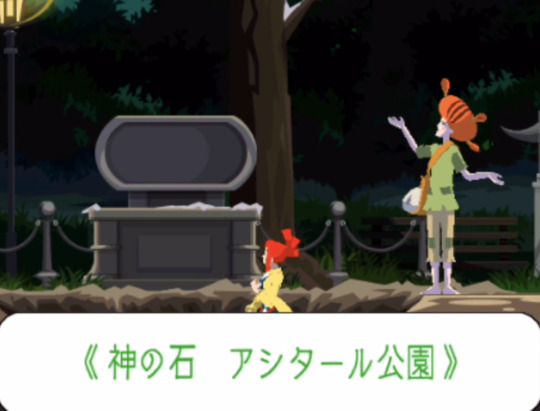

It’s a shame this didn’t translate well into English because I had forgotten this reveal and it really worked on me when I replayed it in Japanese and it was great!
Here's a video of a Japanese person playing ghost trick and realising the word play!
308 notes
·
View notes
Text
𝕔𝕙𝕚𝕟𝕖𝕤𝕖 𝕞𝕖𝕞𝕖𝕤 | 中文迷因
please accept and enjoy some obscure memes that my friends and i use everyday in our “我们的中文比较好” group chat
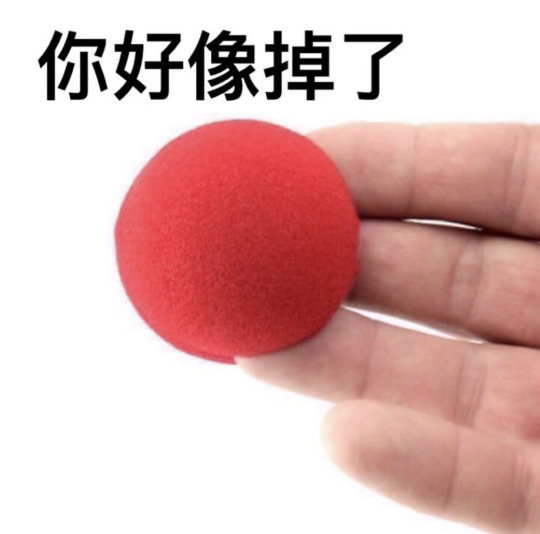

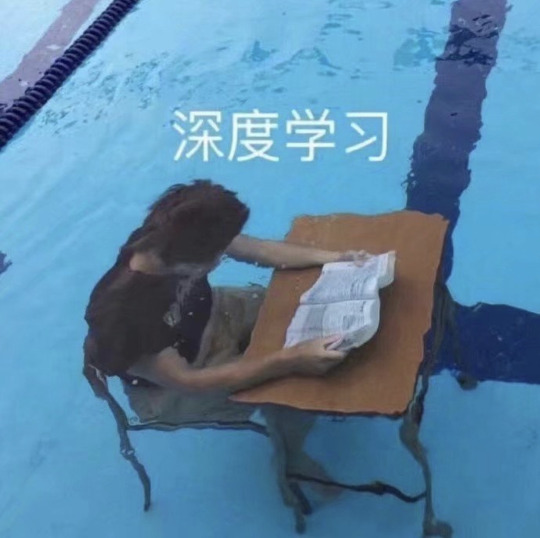


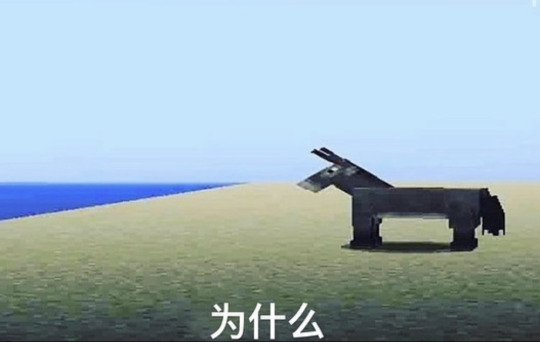
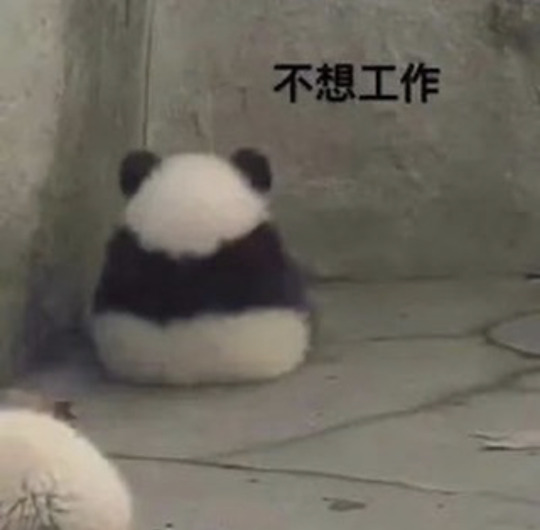



*more will be added as a continued thread*
56 notes
·
View notes
Text
成语故事 – 望梅止渴
望梅止渴 / wàng méi zhǐ kě
lit: "to quench one's thirst by imagining plums"
meaning: to relieve hurt / console oneself by imagining something good/illusions
生词:
部队 (部隊) / bù duì / army, troops
讨伐(討伐) / tǎo fá / to send (army) to suppress / crusade
叛军(叛軍)/ pàn jūn / rebel group/army
正直 / zhèng zhí / just when...
随身(隨身) / suí shēn / to carry (on one's person)
携带(攜帶)/ xié dài / to carry (TW pronunciation: xī dài)
喝光 / hē guāng / to drink all of, to drink up/finish
体弱(體弱)/ tǐ ruò / debility
中暑 / zhòng shǔ / heatstroke
晕倒(暈倒)/ yūn dǎo / to pass out, faint
向导(嚮導)/ xiàng dǎo / guide, escort
绕路(繞路)/ rào lù / to make a detour
饥渴(飢渴)/ jī kě / hungry and thirsty
沉思 / chén sī / to ponder, contemplate
声张(聲張)/ shēng zhāng / to disclose, make public
加把劲儿(加把勁兒)/ jiā bǎ jìn er / to make extra effort
解渴 / jiě kě / to quench thirst
仿佛(彷彿)/ as if
步伐 / bù fá / pace
故事:
东汉末年,曹操率领部队去讨伐叛军张绣。当时正值盛夏,太阳火辣辣地照着大地,将士们随身携带的水中就喝光了,行军速度越来越慢,有几个体弱的士兵还因为中暑晕倒在路边。看到这种情况,曹操非常着急,他立刻叫来向导,悄悄问他:“这附近有没有水源?”
向导摇了摇头,说:“最近的水源也在山谷的另一边,要绕路才能过去。”
曹操看了看饥渴的士兵,沉思了一会儿,对向导说:“你专心带路吧,不要声张,水的事情让我来想办法。”
说完,曹操骑马爬山一个山头,他假装向远处看了看,然后扭过头对士兵们说:“大家加把劲儿,我找到解渴的东西了!”
士兵们一听,一下子来了精神,忙问:“什么东西?”
曹操指了指前方,说:“这条路我以前曾经走过,我知道在前面不远的地方有一片梅林,梅子结得又多又大,到了那儿就可以解渴了。”
士兵们听了,口水直流,仿佛已经吃到了酸甜可口的梅子,顿时觉得没那么渴了,步伐也随之加快了。这时,曹操派人快步翻过山谷,取来水,士兵们痛快地喝足了水,又继续赶路了。
136 notes
·
View notes
Text
Articulatory Phonetics - 调音语音学
字音 zǐyīn - (n.) consonant (also 福音 fǔyīn)
调音部位diàoyīnbùwèi - (n.) place of articulation (also 发音部位)
双唇音 shuāngchúnyīn - (n.) bilabial sound
唇齿音/齿唇音 chúnchǐyīn/chǐchúnyīn - (n.) labiodental sound
齿音 chǐyīn - (n.) dental sound
齿龈音 chǐyínyīn - (n.) alveolar sound
龈腭音 yín'èyīn - (n.) alveolo-palatal sound
卷舌音 juǎnshéyīn - (n.) retroflex sound
腭音 èyīn - (n.) palatal sound
软腭音 ruǎn'èyīn - (n.) velar sound
小舌音 xiǎoshéyīn - (n.) uvular sound
咽音 yānyīn - (n.) pharyngeal sound
声门音/喉音 shēngményīn/hóuyīn - (n.) glottal sound
调音方法 diàoyīnfāngfǎ - (n.) manner of articulation
阻碍音 zǔ'àiyīn - (n.) obstruent
塞音 sèyīn - (n.) stop, plosive
擦音 cāyīn - (n.) fricative
咝音 sīyīn - (n.) sibilant
塞擦音 sècāyīn - (n.) affricate
响音 xiǎngyīn - (n.) sonorant
鼻音 bíyīn - (n.) nasal
流音 liúyīn - (n.) liquid
边音 biānyīn - (n.) lateral
近音 jìnyīn - (n.) approximant
半元音bànyuányīn - (n.) semivowel, glide
颤音 chànyīn - (n.) trill
弹音 tányīn - (n.) tap
闪音 shǎnyīn - (n.) flap
发声态 fāshēngtài - (n.) phonation
清音 qīngyīn - (n.) voiceless sound
浊音 zhuóyīn (n.) voiced sound
送气音 sòngqìyīn - (n.) aspirated sound
不送气音 búsòngqìyīn - (n.) unaspirated sound (also 非送气音)
发声起始时间 fāshēngqǐshǐshíjiān - (n.) voice-onset time (VOT)
元音 yuányīn - (n.) vowel
元音高度 yuányīn gāodù - (n.) vowel height
元音舌位 yuányīn shéwèi - (n.) vowel backness
前元音 qiányuányīn - (n.) front vowel
央元音 yāngyuányīn - (n.) central vowel
后元音 hòuyuányīn - (n.) back vowel
闭元音 bìyuányīn - (n.) close vowel
次闭元音 cìbìyuányīn - (n.) near-close vowel
半闭元音 bànbìyuányīn - (n.) close-mid vowel
中元音 zhōngyuányīn - (n.) mid vowel
半开元音 bànkāiyuányīn - (n.) open-mid vowel
次开元音 cìkāiyuányīn - (n.) near-open vowel
开元音 kāiyuányīn - (n.) open vowel
圆唇元音 yuánchúnyuányīn- (n.) rounded vowel
不圆唇元音 bùyuánchúnyuányīn - (n.) unrounded vowel
鼻化元音 bíhuāyuányīn - (n.) nasal vowel
声调/声 shēngdiào/shēng - (n.) tone
阴平声 yīnpíngshēng - (n.) high level tone
阳平声 yángpíngshēng - (n.) rising tone
上声 shǎngshēng (also shàngshēng) - (n.) falling-rising tone
去声 qùshēng - (n.) falling tone
轻声 qīngshēng - (n.) neutral tone
声道 shēngdào - (n.) vocal tract
发音器官 fāyīnqìguān - (n.) articulators, speech organs
肺脏 fèizàng - (n.) lungs
喉 hóu - (n.) larynx
声带 shēngdài - (n.) vocal folds
振动 zhèndòng - (v.) vibrate
口腔 kǒuqiāng - (n.) oral cavity
颚 è - (n.) jaw
鼻腔 bíqiāng - (n.) nasal cavity
舌根 shégēn - (n.) tongue root
舌面 shémiàn - (n.) tongue body (dorsum) (also 舌背)
舌尖 shéjiān - (n.) tongue tip
We can also divide the tongue like this: 舌前部,舌中部,舌后部
气流机制 qìliújīzhì - (n.) airstream mechanism
外呼音 wàihūyīn - (n.) egressive sound
内吸音 nèixīyīn - (n.) ingressive sound
肺部外呼音 fèibùwàihūyīn - (n.) pulmonic egressive sound
声门外呼音 shēngménwàihūyīn - (n.) glottalic egressive sound
挤喉音 jǐhóuyīn - (n.) ejective consonant
声门内吸音 shēngménnèixīyīn - (n.) glottalic ingressive sound
内爆音 nèibàoyīn - (n.) implosive consonant
舌内吸音 shénèixīyīn - (n.) lingual (velaric) ingressive sound
搭嘴音 dāzuǐyīn - (n.) click consonant
声源-滤波器理论 shēngyuán-lǜbōqì lǐlùn - (n.) source-filter theory
168 notes
·
View notes
Text
ART HISTORY WORD LIST [part 2]
구조 [構造] - structure
왕릉 [王陵] - royal tomb
계급 [階級] - class, rank
장식되다 [裝飾되다] - be decorated
정면 [正面] - facade front
분담하다 [分擔하다] - to share
설화 [說話] - tale
별자리 - star constellation
도교 [道敎] - Taoism
고분 벽화 [古墳壁畫] - tomb fresco
권위적 [權威的] - authoritative
천장 [天障] - ceiling
승려 [僧侶] - Buddhist monk
공양하다 [供養하다] - to offer food to Buddha
기상 [氣像] - spirit
배치하다 [排置하다] - to arrange
웅혼하다 [雄渾하다] - dynamic
원근감 [遠近感] - perspective
설채 [設彩] - to draw background with ink and then color it
씨름 - korean wrestling, ssireum
유래되다 [由來되다] - to originate
무예 [武藝] - martial arts
색채 [色彩] - tone (color)
내세 [來世] - afterlife
귀족 [貴族] - aristocracy
제왕 [帝王] - emperor
사신 [四神] - Four Symbols - four mythological creatures appearing among the Chinese constellations along the ecliptic, and viewed as the guardians of the four cardinal directions. These four creatures are also referred to by a variety of other names, including "Four Guardians", "Four Gods", and "Four Auspicious Beasts". They are the Azure Dragon of the East, the Vermilion Bird of the South, the White Tiger of the West, and the Black Tortoise of the North. Each of the creatures is most closely associated with a cardinal direction and a color, but also additionally represents other aspects, including a season of the year, an emotion, virtue, and one of the Chinese "five elements" (wood, fire, earth, metal, and water). Each has been given its own individual traits, origin story and a reason for being. Symbolically, and as part of spiritual and religious belief and meaning, these creatures have been culturally important across countries in the East Asian cultural sphere.
청룡 [靑龍] - Azure Dragon, Blue Dragon
백호 [白虎] - White Tiger
주작 [朱雀] - Vermilion Bird, Red Phoenix
현무 [玄武] - Black Tortoise

#korean#word list#korean vocabulary#korean language#langblr#learning languages#language study#foreign languages#language blog#korean word of the day#hangul#hanja#korean history#korean art#한국어#한국미술사
#korean#foreign languages#language study#korean word of the day#langblr#korean language#korean history#korean art#한국어#hanja#hangul#word list#한국미술사#korean culture
31 notes
·
View notes
Text
An azure-winged magpie (灰喜鹊).
English added by me :)
11K notes
·
View notes
Text
Vocab Highlight: 一生
一生(いっしょう) is a word in japanese that is used in many more situations than it would seem at first glance from looking up the english meaning in a dictionary.
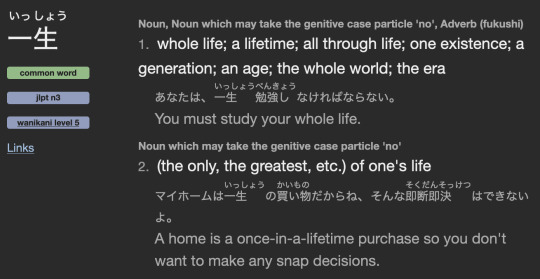
From this you can gather that you can use 一生 to describe actions you habitually do for your whole life, like study. And, you can use it to mean “once-in-a-lifetime” or “~est thing of your life”. These seem like pretty limited usecases compared to how often it’s actually used in japanese conversation. In reality, japanese people often use the word 一生 where we would use the word “forever” (or “never” in a negative sentence).
偽りの生活を一生続けることはできない
You can’t keep living this lie forever.
一生付き合っていくのか、こんな足と?
Am I gonna have to live with this foot (pain) forever?
これは私にとって一生忘れられない思い出です
This is a memory I’ll never forget.
This is just another reminder that memorising dictionary definitions is not enough to get the real meaning of a word! You must learn how the words are actually used (from immersion, or studying lots of example sentences)
99 notes
·
View notes
Text
some korean vocab I learned from the random schedule

some new vocab for me that I encountered in this schedule of training camp for social workers.
성희롱 - sexual harassment
마음건강검사 - mental health examination
효과적인 의사소통 - effective communication
수료식 - completion ceremony
사회재난과 안전 - social disaster and safety
갈등대처 - conflict response
귀가 - return home
규율과 규정 - discipline and regulation
#korean#korean vocab#language learning#한국어#foreign languages#korean vocab list#korean langblr#language study#langblr#korean word of the day#language stuff#random vocab
18 notes
·
View notes
Text
I would say comedy genre has more verbs and action situations in general, so maybe look up these? my suggestions:
랑데뷰
인삼류
위아더좀비
월유메리미
신혼일기 (and other from the author)
대신 심부름을 해다오
하루땃따
드로잉 레시피
소소한 일상기록둔
좌충우둘 미대생존기
hope it helps!
does anyone know of some webtoons that would be good for learning Korean if you have a lot of random noun vocabulary but not a lot of grammar & verbs
2 notes
·
View notes
Text
231126 chinese journal log
我出去散步,外面正下着暴风雪。 时速约 50 公里。街上没有人。也看不到汽车。我走了一个小时,一路上没有看到任何人。一切看起来都像是后世界末日的景象。我只能听到呼啸声和脚下积雪的嘎吱声。我再次确信,冬天是我最喜欢的季节。
散步 - take a walk
暴风雪 - snowstorm
公里 - kilometer
街上 - on the street
一路上 - along the way
后世界末日 - post-apocalypse
景象 - scene
呼啸 - whistle
脚下 - under the foot
嘎吱 - crunch
再次 - once again
确信 - to be convinced
季节 - season
#chinese#chinese vocab#journal log#chinese language#chinese langblr#langblr#language study#language practice#it was actually hard to write#foreign languages#vocab
0 notes
Note
have u heard of the phrases 直男癌 and 凡尔赛 they r unrelated to eachother but i thought it would be inconvenient 2 send 2 asks
直男癌 (literally "straight male cancer") refers to male chauvinism
凡尔赛 is slang for the act of humblebragging (usually on social media). It is originally/also the transliteration of "Versaille", the famously ornate palace of King Louis XIV, so you can perhaps see where the slang comes from. If you see something that's saying a post is 凡尔赛文学 ("Versaille literature"), it's saying that the post was made as a humblebrag. A person who talks like Versaille is boasting while pretending to be modest.
153 notes
·
View notes
Text
小红书 Vocab
小红书 (also referred to as xiaohongshu or XHS) is a Chinese image-based social media platform. It is a combination of the feed, likes, shopping, and video aspects of instagram, with the ~aesthetics~ and majority female audience of pintrest. I've grown really fond of it and found that it's algorithm is better than instagram and MUCH better than pintrest with giving me content I enjoy.
I'm going to offer some vocab that is either unique to the platform, or slang that is found on the platform (esp in bullet comments). I don't want this to be too long, so some terms may be omitted if they are found on many other social media apps
APP
小红书: Literally "Little Red Book". Probably a play off of Chairman Mao's book of speeches and writings which is also referred to as the Little Red Book. The app is not at all political, but more so trying to evoke the "essentiality" and "knowledge" aspect of the term.
笔记: Notes. XHS's name for its posts
收藏: Favorites. Separate from likes, these are bookmarked collections. This and Likes can be hidden
赞过: Likes. Notes that you "heart" will appear here.
关注: Notes from people you follow
发现: Discovery tab
附近: Recent notes
CONTENT
直播: Live-Streams
美甲: Nail Art
穿搭: Style
美食: Food
发型: Hairstyling
头像: Avatars/Profile Pictures
动漫: Animation and Comics
彩妆: Makeup
壁纸: Wallpapers
绘画: Drawing/Art
护肤: Skincare
影视: Film/TV
游行: Travel
减肥: Weight Loss
家居: Home
家装: Interior Design
学习: Studying
读书: Reading
情感: Romance
攝影: Photography
手工: Crafts
文化: Culture
游戏: Video Games
音乐: Music
舞蹈: Dance
搞笑: Comedy
明星: Stars
文具手: Stationary
校园生活: School Life
心里: Psychology
科学科普: Science
艺术: Art
社科: Social Sciences
萌龙: Cute
综艺: Variety
箱包: Handbags
潮鞋: Sneakers
健体塑型: Bodybuilding
职场: Office
婚礼: Wedding
汽车: Automobiles
潮玩手办: Collectable Figures
母婴: Parenting
机车: Motorbikes
户外: Outdoors
运动: Sports
露营: Camping
COMMENTS
(Things you'll see in tags/descriptions/bullet comments)
PLOG: Picture blog. Usually like a blog, but with photos/photo collage (also sometimes vlogs get this tag even though they're videos)
爱自己的100种方式: Originally from a feature on Douyin that would give a "treat yourself" style prompt if you comment this phrase
泰酷辣: Cool. Took off from this meme. “太酷啦”
上岸: Similar to "Goals". Usually posted to applaud an achievement/amazing life experience
巨: Super. Usually used in describing really tasty food “巨巨巨好吃”
cos: Cosplay
emo: The original meaning—emotional. More often used to mean a depressed mood than the style/subculture
磕: to ship a couple (cp)
For the Lesbians
t: Tomboy/masc lesbian (Sub-types include 铁t,奶t,娘t, 爷t, 长发t, 短发t)
p: Femme lesbian (p said to come from "Pretty girl" or “婆”)
h: neither femme nor masc/futch
le/les/啦啦: Lesbian
双女主: F/F couple (IRL or in fiction)
淘淘乐/TTL:T/T relationship
泡泡龙/PPL: P/P relationship
黄鹤楼HI: H/H relationship
TPL: T/P relationship
🐟: Ultra passive bottoms
140 notes
·
View notes
Text
Excerpt from the Heart Sutra
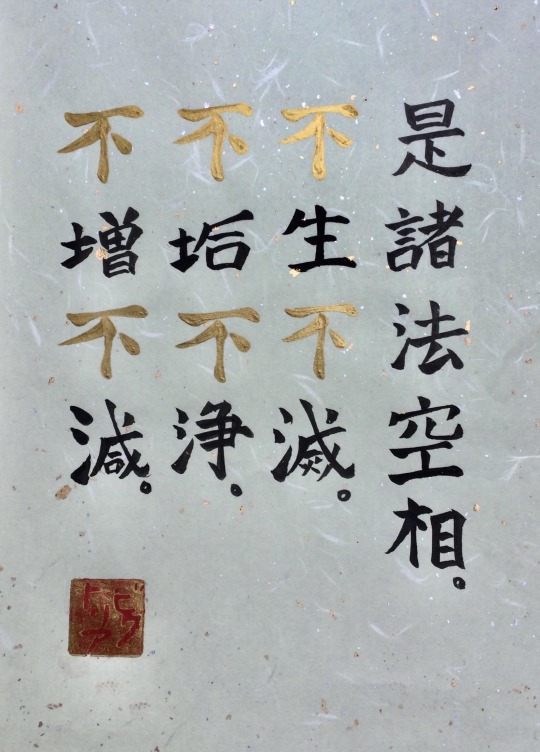
是諸法空相 = All phenomena bear the mark of Emptiness
不生不滅 = no Birth no Death
不垢不浄 = no Defilement no Purity
不増不減 = no Increasing no Decreasing
(Translation by Thich Nhat Hanh)
The Heart Sutra is one of the most important sutras (religious texts) in Buddhism. It celebrates the idea that all things of the physical world are "empty"; this is the true nature of reality.
This insight can help us to overcome all pairs of opposites: birth/death, defilement/purity, increasing/decreasing, subject/object….
This is a state of coolness, peace, and non-fear which can be experienced in this life.
116 notes
·
View notes
Text
神無月 (kan-na-zuki) "October" (archaic)
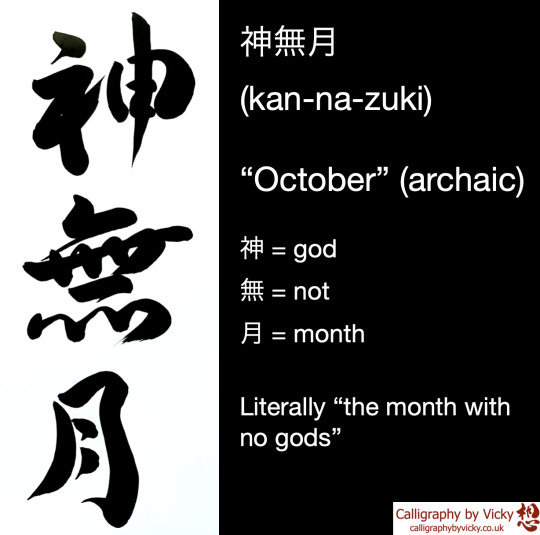
神 = god
無 = not
月 = month
The modern Japanese word for October is 十月 (literally "10th Month), however in the old-fashioned calendar is was known as 神無月, or "the month with no gods".
In October, all the gods in Japan (there are believed to be 8 million of them) go to Izumo Shrine in Shimane Prefecture for a meeting, thus leaving most of Japan with no gods.

The huge shimenawa (sacred rope) at Izumo Shrine.
923 notes
·
View notes